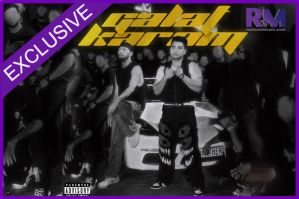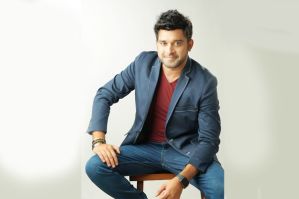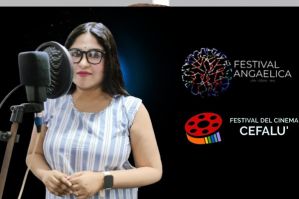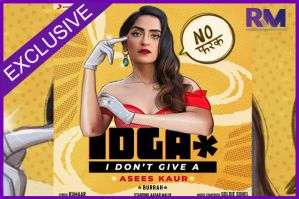Music historian Dinesh Ghate - "Advances in technology have put many musicians out of work"



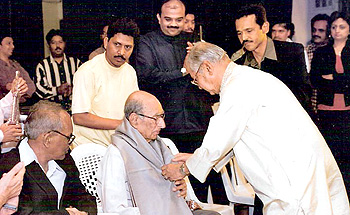

Musician Dinesh Ghate is on a mission to honour the unsung instrumentalists' contribution to the golden era of Bollywood music. Profiling them and felicitating them, his periodical, Swar Aalap is a platform for these forgotten musicians to unveil their talent. In a conversation with Radioandmusic.com's Anita Iyer, Ghate reveals his journey of discovering the musicians and feature editor Kushal Gopalka compares the current music to that of the days gone by.
· What prompted you to come up with the idea of felicitating these unknown faces?
D: I am a musician playing Octapad and conduct shows regularly. In one of these shows some years ago, the audience enthusiastically applauded the orchestra. The anchor then named the singers and the organisers of the event was congratulated, but we were given no credits. It struck me at that moment that we musicians were neither introduced nor acknowledged, and the idea was born.
· How do you discover these artistes?
D: I am a musician so I know people in the industry who pass on the names of the forgotten musicians. After six months, I got in touch with some senior musicians as it was difficult to trace them; many had left Mumbai and some had expired. After meeting them, we used to play the tracks and ask them to recollect the musicians who were involved in the making. It was important to cross check the musicians' names as we could not rely on their memory. After discovering a few names, we didn't know how to honour them and finally launched a magazine to profile them.
· When did you start Swaar Aalap?
D: It was in 2002 that I, along with my father S J Ghate started the 12 page newsletter. It was a black and white copy and was launched by singer Falguni Pathak. The annual subscription was Rs 300 and it used to cost me eight rupees per copy to dispatch them. All my savings were spent on the venture. Sometimes my friends used to contribute some ads for these copies. Then I enquired about registration and after some months launched �Swaar Aalap' officially and today we have subscribers within the industry as well as abroad.
· Swar Aalap enjoys the distinction of being the only magazine of its kind…
K: There are people researching Indian Bollywood music using Swar Aalap and we even dispatch copies to Voice of America. It was because of Swar Aalap that a radio station once dedicated an hour for songs by Cawas Lord.
· Does Swar Aalap also provide financial aid to these forgotten musicians?
D: Today, all these musicians are out of work due to advances of technology and machines compose most of the music. 80 per cent of the musicians are in poor conditions and need financial help. We hold an annual function when we felicitate musicians and have a committee of senior musicians to suggest who should receive the financial grants. Apart from the grants, we also provide medical help to patients who cannot fund their needs.
· Do you see the scenario changing for the better for the musicians?
K: Since the past three to four years, most albums have been giving due credit to their instrumentalists. Earlier, while some hair stylists and spotboys used to get credit, very few arrangers used to get credit for their work, but today their names are mentioned in the credits.
· How many artists have you felicitated till date? Who are you going to felicitate this year?
D: Swar Aalap has felicitated about eight artistes till date and this year we are going to felicitate Jairam Acharya and Burjor Lord. Burjor Lord's greater contribution perhaps is with mallet instruments like Vibrophone, Xylophone and Glockenspiel and he has contributed to songs like Tere husn ki kya tareef karun, Deewana hua baadal, Ajeeb Dastaan hai yeh etc. Jairam Acharya has been in the industry for 50 years and people still don't know him. He has worked on some great songs like O sajna bahar aaye. We will hold our annual ceremony on 15 February 2009.
· Can you name some artists whom you have felicitated?
K: In 2006, we felicitated Ustad Rais Khan who is among the top three sitarists in the world. He has contributed to classics like Nainon mein badra chaye, deewana hua baadal, Jaiye aap kahan jayenge, Baiya na dharo, chandan sa badan etc. Also, we awarded Kersi Lord who is 75 plus today and bought the first synthesizers to India and is the force behind some vintage songs like Main zindagi ka saath nibhaata chala gaya, Tum jo mil gaye ho etc. His father, Cawas Lord who is 98 year old has composed for more songs than Lata Mangeshkar, Mohammed Rafi and Asha Bhosale put together.
· What is their reaction when you honour these musicians?
D: It is an emotional moment every year when we honour them publicly for their immense contribution to the industry. Many say, Thanks for reminding that the musician in us is still alive, otherwise we had forgotten that ourselves!...
· How much freedom do the arrangers have in a music composition?
D: While composing tracks, the music directors design the skeleton and it is the arranger who decides which instruments to use as also the flesh of the songs. In case of instrumentalists like Ustad Rais Khan, Manohari Singh, the directors used to leave space in the songs to be filled by music pieces created by these legendary musicians. They would in turn create some eight to ten pieces keeping the situation of the song in mind and the director would pick one.
K: I would like to particularly add about Ustad Rais Khan that a 8 bar piece would be left for him to compose after listening to the antara and mukhada.
· What do think about today's way of composition?
D: Although the music arranger plays a vital role in music compositions, they are sidelined and the music directors are in the limelight for their compositions. The musical pieces in the songs are not composed by music directors; rather they employ some newbies who create some music on board and the director shortlists and uses it without any credits. Today you need to be essentially keyboard savvy to compose music.
· Do you think music today has lost its soul?
K: I guess for that we need to understand the soul of music. Music does different things to different people and today, music gives pleasure when it is foot tapping. It has to be rhythm heavy and the grip on lyrics and melody is much less. Also the lyrics are just tukhbandhi, where the last words in a line rhyme with the line above. So, if that gives pleasure to people, the industry has to produce such songs because there is a market for it.
· Can you mention any grave difference between old classics and contemporary numbers?
K: During old times, they mainly banked on acoustic instruments, the melody used to be raw with no electronic sound. The music coming out of bleeding fingers on sitar chords cannot be compared to the music coming from a press of a button. Imagine the vibrations coming out of a recording studio where maestros like Pt. Shiv Kumar Sharma, Ustad Rais Khan and Pt. Hariprasad Chaurasia are composing a track.
· Are these shows sponsored or is it difficult to get sponsorship?
D: Sponsorship is difficult because it is highly celebrity driven. Sponsors are hung up on celebrity names and have their hidden agenda. But for us, quality of work is more important than big names. I design shows where there are all acoustic instruments with no electronics and also I demand special lighting effects for all musicians.







